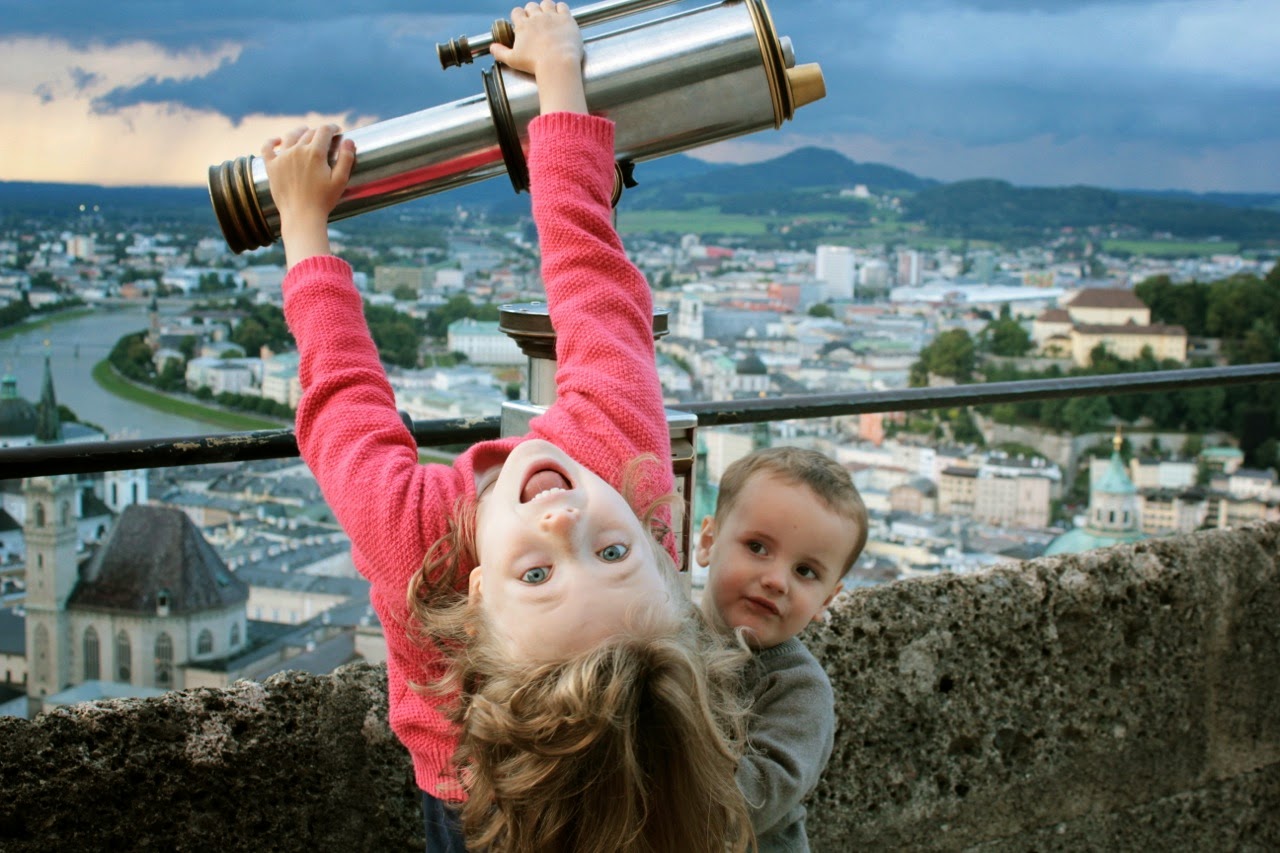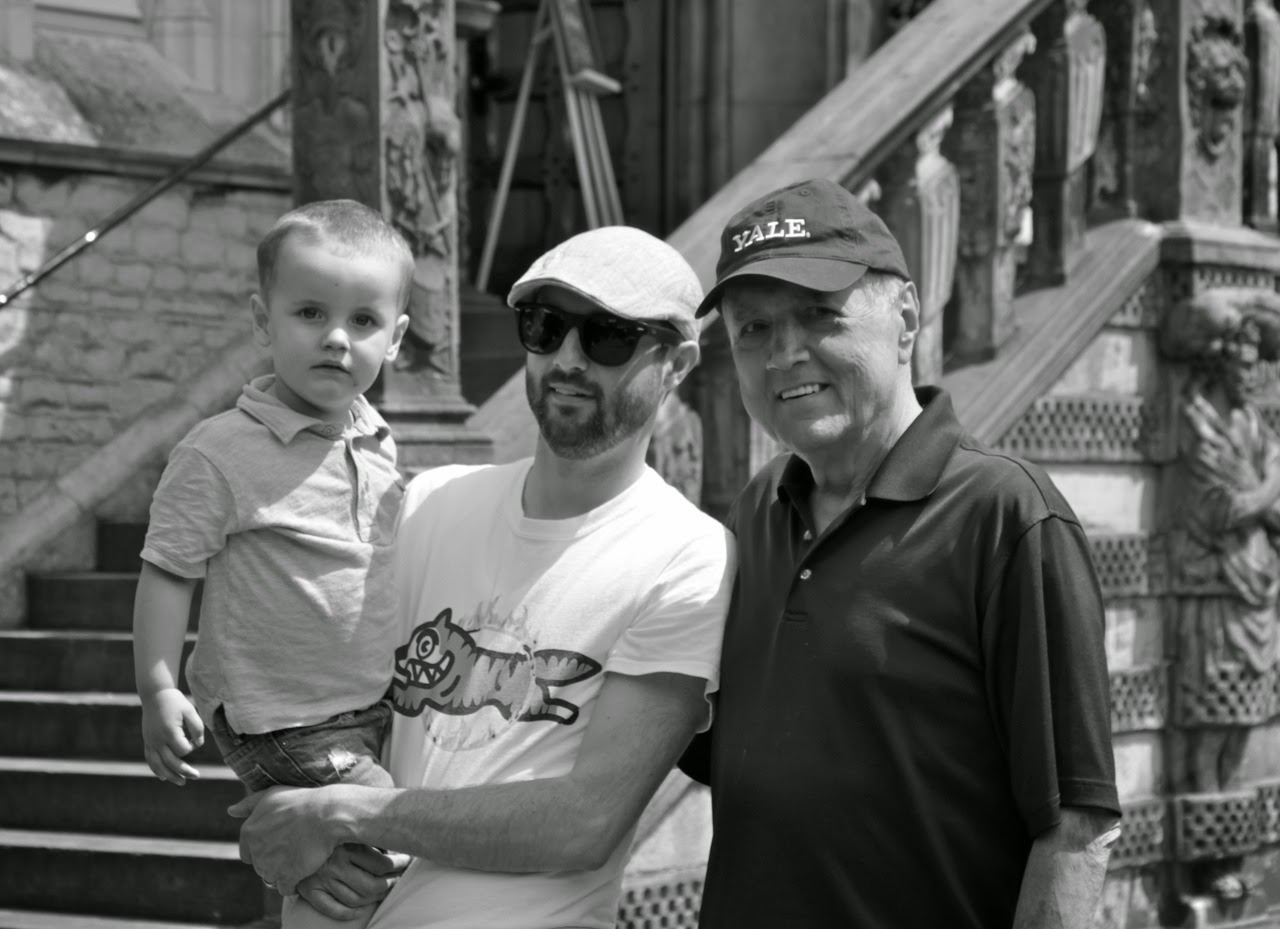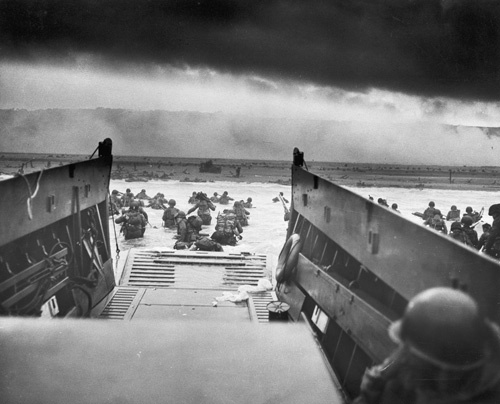The sign at the trail's head read Herzogstand, 2.5h, with an
arrow directing us to ditch the car, at which the clouds overhead were tossing smatterings of precipitation, and hike up into the woods to our right. The gondola to the lodge at the top of the mountain, where Joerg's fortieth birthday party was underway, had stopped running twenty minutes earlier. On foot was the only way up, and we had two over-traveled kids in the backseat and two exhausted parents in the front.
We had been late even before leaving Munich to sit in weekend construction traffic on the Autobahn. After a late-night return from Salzburg the day before, we had planned a morning of quick errands at Merianplatz--wooden hairbrush, giant pretzels, sausages--before our departure for the mountains. Parking difficulties and torrential rain, however, had turned our Hour, tops jaunt into four hours of leapfrogging from shop awning to shop awning, both umbrellas having gone the way of all the earth. From time to time our children would belly-flop onto the wet cobblestones and emit such high-pitched screams that every head in the square would turn in our direction, and elderly passers-by would fix them with disapproving looks and give them what I assume were lectures about their bad behavior in German. Back at the car we had checked the party email for directions only to find that the festivities were to commence mid-afternoon, not around dinnertime as I had thought, in spite of my having glanced over the email on at least two prior occasions.
Now, staring at the trail head sign and frantically considering what it would take to hike the two-and-a-half hours up the mountain with our kids and an overnight bag, embarrassment, frustration, fatigue, and, worst of all, the knowledge that we were missing celebrating with our friends, washed over me in quick succession. I whispered Uncle from behind the hand covering my face and Steve put the car in motion again. We drove on in silence, past Lake Walchensee, stunning in the filtered light and framed by blue mountains, and cute little Bavarian chalets, until my phone indicated that it had 4G outside of a picture-perfect Bavarian restaurant. In five minutes we had a hotel for the night in the next town, and in another five we were in the restaurant ordering a locally-grown salad and wood-fired pizza, to be followed by homemade strawberry and banana ice cream.
 |
| Bamburg, Germany |
 |
| Davis in Ghent |
 |
| Public poetry project, Utrecht |
I felt awful; fatally flawed. Then, unexpectedly, peace washed over me. It was like the relief of a storm breaking after days of oppressive heat. The dramatic gesture of missing the party for which we had spent nearly two weeks and a significant amount of money to attend, all because of a minor logistical error on my part, allowed me to admit to myself that I had not been realistic at all about our summer and my ability to adapt to its constant changes. I remembered our anticipation in mid-June at the idea of having so many people we enjoy visiting in quick succession, showing them our new home and favorite day-trips, popping over to Belgium for a night here and Normandy for a few nights there, showing a friend's niece Paris for the first time. We had done it and were rapturous to be seeing everyone, but all along we had had the feeling it would be more fun to look back on than it was in the moment. Not the way I had envisioned it.

I sat waiting for the pizza while Steve and the kids played outside, my thumbs poised to make notes on my phone in the absence of a notebook, trying to make sense of our lives so as to avoid repeating such mistakes in the future. I realized that there had been several clues that things were out of control which I had been ignoring for weeks: constant difficulty getting out of the door on time, a physical sensation of always being severely out of breath, the fact that we left home driving in the general direction of Munich with no specific plans or hotels booked, even for that night, ten days before the missed party. I usually research like a fiend, brandishing printed sheets full of options tailored to our needs for any country we are visiting. I had been so busy before we left that my sheets wallowed on my laptop at home, incomplete and unprinted.
In this moment of honest self-reflection at the pizza place, I also had to admit that I had not truly had a grasp on Time since our move last year, and tried to remember what I had done in the past to organize myself. It took a few minutes to unearth simple procedural memories: a single handbag tidied daily; in that handbag, a paper agenda, rather than a calendar on my phone; a dedicated time every morning for correspondence and calendar items; an apartment in which I had designated a place for everything, and never put anything anywhere but in its place. To do otherwise left me prone to the chaos of my mind, as I was demonstrating so thoroughly.
Over the summer, with such close proximity to so many people that we know well, I observed that individuals and their relationships to Time and Place can be arranged on a sort of spectrum, and that couples tend to be composed of one individual from either side of center on the spectrum, however similar they may be to one another when compared with the world at large.
On one side lives the Time-Keeper. If she says she will be at x place at x time, she is there. She views time as something to be carefully managed, budgeted, and spent. She is most likely an early riser and is good at accomplishing fixed goals. She is dependable. From the other side of the spectrum, the Time-Keeper may seem rigid or unemotional. Her less time-conscious partner may feel that she is not as thorough as she could be, or leaves things imperfect in her effort to be in the right place at the right time. The Time-Keeper views tardiness as irresponsible, disrespectful, and an indication of priorities. And she is not wrong.
Except that, on the other side of the spectrum there exists the Dreamer, a philosophical type for whom the physical world may be less real than the world of Ideas, Imagery, and Emotion. For this type, wrapping one's head around time can sometimes feel nearly impossible, and prioritizing and organizing it may take monumental effort. Without constant vigilance, he slips back into his world of ideas and that twenty minutes that he had to get where he was going somehow vanished half an hour ago. A fixed appointment, even something routine like getting kids to school or getting to work on time, may require headache-inducing focus. This type may lose things often or be forgetful. It takes years or decades to learn tricks and adopt habits that will mitigate these difficulties, and he may have to start the process over again whenever there is a major life change (e.g. new job, new child, new class schedule). The Dreamer may require a great deal of spacial organization to be functional. Shocking, I know, that I naturally fall into this category.
(I think sheepishly of a line on the C.V. from my early professional life: "Adapts quickly to new situations and procedures." True, if we are talking about new foods, music, places, or this season's trends. Not so, unfortunately, with organizational procedures, schedules, or unspoken rules of etiquette, although I wasn't self-aware enough to realize it at the the time that I was shopping this gem around. Luckily, aside from one corporate P.R. internship, I have worked in creative fields, where my adaptive tendencies are more at home.)
While our natures may be immutable, our indulgences (whether to be late or to be impatient with another's lateness) can be disciplined. In our eleven years together, I and my resident Time-Keeper have gradually moved to the center of the spectrum, although we will probably have to exercise patience with each other until the day we no longer have children at home. On that day, I expect that we will magically start being fifteen minutes early for everything, the years of resistance training having finally paid off. (Have you ever noticed that about grandparents?)
I asked him, in the throes of my self-flagellation over the missed party and all of my other time misses this summer, how he tolerates me. He laughed and said that it was hard at the beginning, but then he started paying attention to how hard I was trying, how much more stressed I was about being on time than he was, actually. I already felt like a failure. He couldn't change that for me,and he couldn't wish me--or berate me--into being on time. In fact, the more he tapped his foot, the more fraught those already stressful minutes became, and the later we ended up being. He decided that he would change himself. Instead of seeing five minutes late as being a failure to be on time, he would look at my gradual improvements and the effort I was making. Aside from the rare big-ticket event, what were the actual consequences, he asked himself, if I made him late? Was he placing what other people thought of him or of us above what was most of worth to him? Was his anger or feeling that he was right in that situation worth what it cost our relationship? And how did these qualities that led to my functional difficulties benefit him in other ways? According to him, I make his life more fun than another spreadsheet jockey like himself would have. Vague but I'll take it.
As for myself, I had to learn the opposite. First, I had to step back from my own stress and embarrassment and think about how my actions were making others, especially my husband, feel.
Then what? For times when I know there will
be a lot of upheaval and excitement, I have to remember to schedule days
for rest and organization. In college I realized that I had to get rid
of my watch, which I would look at obsessively rather than doing the
things that would actually help me to be punctual. At some
point, after a missed flight on Christmas Eve early in our married life,
I figured out that nothing works so well as leaving a big fat cushion
before a serious deadline. I know that our weaknesses can become
strengths, given enough time and work, because we don't miss flights anymore.
I have to repeatedly teach myself, still, after all these years, how to prioritize items with deadlines and make plans to meet them, sometimes at a level of detail that a child (well, a Time-Keeper child) would scoff at. Put shoes by front door. Pack church bag night before. Set alarm for thirty minutes before I have to leave for school pick up. I have to remind myself that emotion and spontaneity are good traits only when bridled properly. I have to watch the things that people who are on time do, and figure out how to do them for myself. Luckily for me, there are a lot of punctual people in the world to emulate. I make my travel dossiers.
I also have to convince myself again and again that not doing these things naturally does not make me an idiot. I have to remind myself that while Steve may run errands twice as fast as I do or clean the kitchen in fifteen minutes less, he doesn't always think things through and do them as thoroughly as I do.
It seems so simple: On time = Good. Late = Bad. The truth, though, like almost all truths, is more complex. The world needs all of us, Dreamers and Time-Keepers alike, even with the faults that accompany our gifts. We need big ideas and we need the trains to run on time. We want mind-blowing art projects and people to manage the logistics of mounting exhibitions that allow us all to see them. We need people at every position of the spectrum. We need that, and we want it, too.
That stormy day and night in Bavaria made the rest of our trip a bucolic one. We stopped in beautiful Fussen, Germany for a couple of days and had dinner in Lichtenstein, adding a new country to our list. I spent a day enjoying the collection at the Kunstmuseum in Basel, Switzerland while Steve and the kids went to the zoo. We peeked at the antiques in Colmar, France and loaded up on local treats at a boulangerie in Strasbourg. By the time we met up again with Jen and Alex in Ghent, Belgium we were able to revel in things as they were happening. Sometimes it just takes stopping for a minute to look at things, even if the stop is a forced one.
Yes, those are my thoughts for the summer, finally, in November. Here are a few photos from the second half of our summer. As you can see, it was not so bad as all that.
 |
| Skinny-dipping at Nymphenburg Castle |
 |
| Boating at Nymphenburg Castle |
 |
| Ghent |
 |
| Sunset in Salzburg |
|
 |
| BMW Museum, Munich. I love Townsend's face, like he owns this thing. |
 |
| Saint Nicolas, Ghent |
|
 |
| Playing at home in the North Sea |


























































